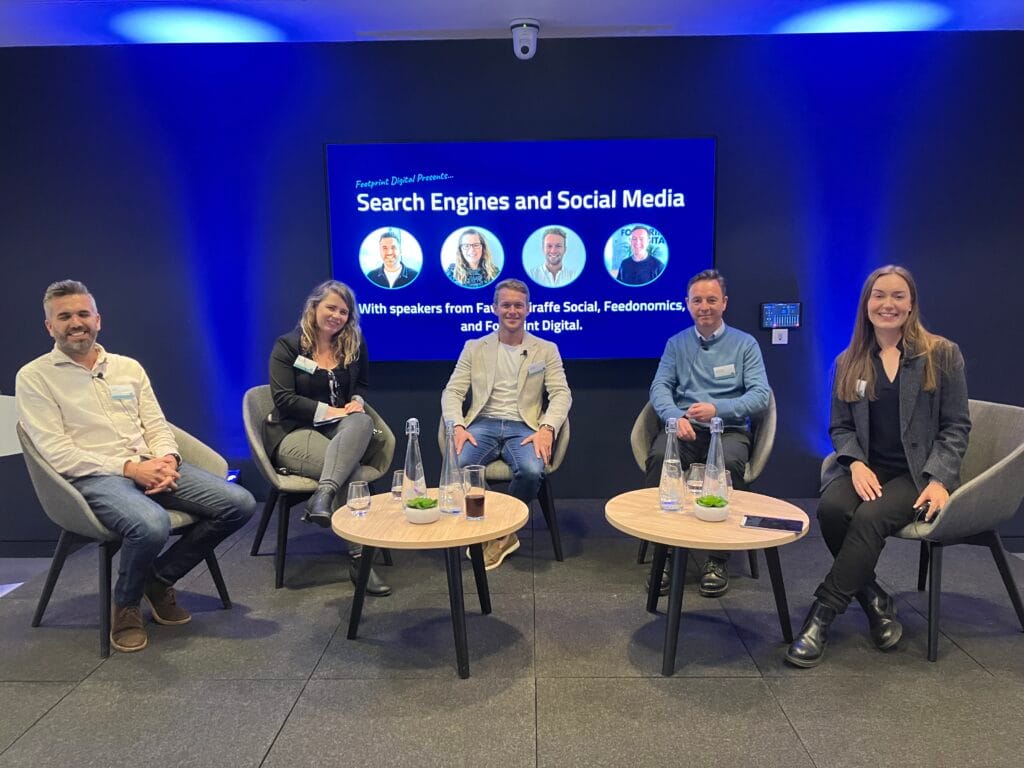
Blog
Search Engines and Social Media: The Shift Towards Community and Social Searching
23rd May, 2024
How has user behaviour around information retrieval and content discovery changed online and has there been a shift away from traditional search engines towards social platforms?
If so, what factors are driving this change and what does this mean for marketers?

Welcome to the first article in our series based on a recent panel event in partnership with RPC: “Search Engines and Social Media.” As the digital landscape evolves, so does the way users search for and discover information online. We’re witnessing a shift from traditional search engines, like Google, to social media platforms, particularly TikTok and Instagram.
This trend raises critical questions: What drives this change, and what implications does it have for marketers? With over a billion users worldwide, TikTok exemplifies this shift, where people increasingly rely on authentic user reviews and community-driven insights. Join our panellists, Alex Jester, Kate Webster, Alex Walker and Mick Scanlon, as they explore the dynamics behind this movement and delve into how marketers can adapt to the changing digital environment.
Alex: We’re at the start of a shift of people moving away from traditional search engines like Google, and instead using social media a lot more for their searches. The shift away is mostly coming from TikTok. TikTok now has a billion users worldwide, 23 million users in the UK, it’s no longer just teenagers dancing to songs in their bathrooms during covid, over 50% of their user base are over 25, and on that platform it’s all about real, authentic user reviews and insights of businesses and products.
A thing about TikTok that I think is incredible is that in the US people are using the platform for 125 minutes per day on average, for Instagram it’s 30 minutes. So people are staying within the app and searching within TikTok itself.
I’m a bit tentative about saying that the shift away from traditional platforms is complete, because if you look at ad spend in the US as an example there was about 8 billion dollars of ad spend last year for TikTok and Google was around 60 billion, and I think Google’s biggest threat in terms of this is actually Amazon.
However, we’re definitely seeing a shift towards people wanting to stay within an app like TikTok or Instagram rather than going to traditional search methods. Google themselves recently said that around 40% of Gen Z actually turn to TikTok rather than Google to conduct research, so there’s clearly a move away from search to social.
Kate: It’s definitely different for different demographics, if you look at Gen Z versus millennials and upwards, the percentages of people using TikTok as a search engine is not actually as high as you might think, it’s around 40-46% for the younger generation so definitely there we see that shift, but for the older generations it’s around 30%. The power of search on TikTok is a topic that’s coming up more and more, and it’s improving, even being able to search through the comments sections on TikTok is quite a new feature so they’re really gunning for it with the features that they’re developing.
It also depends on what people are searching for, things like restaurant recommendations, recipes, fashion, you might turn more to TikTok, but if you’re looking for a mortgage you’re not going to be doing that on social media.
An interesting analogy to look at is that generally we tend to stick to the kind of music that we liked in our teenage years, and it would be interesting to see if that is true from a search engine perspective as well. Will Gen Z tend to stick to TikTok as they get older, or move to different platforms?
Tom: Last week I spent in Hamburg as a conference on performance marketing, and TikTok were there and they had a discussion around this topic, and some of the trends that they’re seeing were that people were used to going to Google to look for outfit ideas, and now they go to TikTok because it’s so much better curated for specifics, so the categorisations and the tagging on TikTok really allows users to see very similar searches to an outfit that they’re trying to find in a way that Google doesn’t allow.
Alex: It’s the authenticity of TikTok that people like, if you get a review from a person you’re much more likely to trust that than something written on a website.
Mick: For me, the two things that are driving the change are the community aspect and the content. Google’s success has been built on the simplicity of its search pages whereas social media is much more in your face with video and imagery.
The thing with social media is there is a community and you’re able to search using social media to see if your decisions or tastes are unique, are they socially acceptable, are other people thinking the same as you, do you fit in? You’re getting something back from a community on the social channels that you wouldn’t get from a search engine.
We know that Google has attempted several times to muscle in on social media, Google Plus for example. It was not successful at all, they put a tweet out a week after it was launched saying around 30,000 people had signed up – they didn’t tell you they were Google employees, and it died a death.
More recently they introduced an experiment looking at how recommendation systems can better serve people’s interests called ‘Keen’ which they sunsetted in March of this year. So Google has always known that social is important, and because of the simplicity of Google it might be a threat to them in some ways so they’ve been exploring those avenues.
Google has two things going for them that mean this shift isn’t going to be as speedy as we might expect. The first is that their market share is massive. They were the first search engine that people really bought into and still use. That’s across all demographics. So they don’t need to worry too much there.
The second thing they’ve got going for them is that they own YouTube, and YouTube is the second biggest search engine in the western world. Not many people look at it that way because it’s primarily video content, but it is a social media platform.
I do think that people will grow tired of a straightforward search engine, especially as newer generations come through and they expect better content.
One of the things that we have to do as marketers is acknowledge the shift and understand where we can create this engaging and exciting content through search engines. Google now has an ad format called Performance Max, and you don’t just get shown to users on a search page with a three line text ad, your ads can now appear with images and videos on the search engine pages, in Gmail, on YouTube, all across the display network. They’ve also recently released a new ad format called Demand Gen, which directly targets the TikTok generation with shorter video snippets.
I think in one way they’re fighting a losing battle – I see my two teenage daughters and they’re not interested in Google. They will go to TikTok to buy stuff from ASOS, that’s where they go to search and shop for things.
They can see somebody on TikTok with a dress, a song playing, a pair of shoes on that has got 10,000 likes, they know it’s popular and trending. You get a listing on Google for the same product and it doesn’t have that ‘tick’ from the community and social acceptance around it, and you’ve got no idea what other people are thinking of it. But, they’ve still got YouTube and I think that’s where we’ll see them invest a lot more over the next five or ten years.






